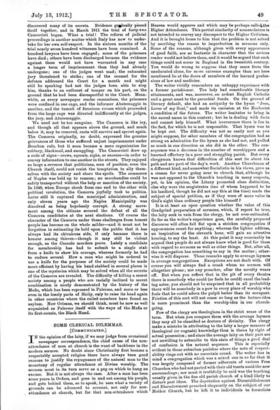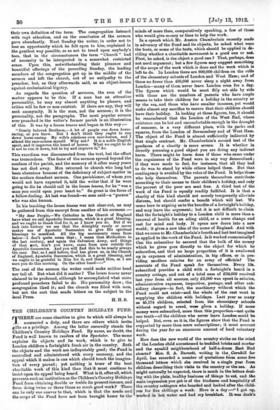I N the opinion of the laity, if we may judge
from occasional newspaper correspondence, the chief cause of the non- attendance of men at church is the want of backbone in the modern sermon. No doubt since Christianity first became a respectably accepted religion there have always been good reasons to justify the repugnance of the natural man to the monotony of regular attendance at Divine worship. The sermon must in its turn serve as a peg on which to bang an excuse. But it is not always the case. After a man has been some years in Orders, and goes in and out among his people, and gets behind them, so to speak, he sees what a variety of grounds can be advanced to account, not only for non- attendance at church, but for that non-attendance which
Heaven would approve and which may be perhaps caller the Higher Attendance. This partial similarity of nomenclature is not intended to convey any disrespect to the Higher Criticism. And it is brought home to him that the problem is not solved by ascribing the reason to imperfection in sermons only. Some of the reasons, although given with every appearance of good faith, are so fantastic in character that the serious reader would not believe them, and it would be argued that such things could not occur in England in the twentieth century. You would do wrong to suppose that they came from the uneducated alone, for more extreme examples than are here mentioned lie at the doors of members of the learned profes- sions of law and medicine.
The writer vividly remembers an unhappy experience with a former parishioner. The lady had considerable literary attainments, and was, moreover, an ardent English Catholic and a great asset to the parochial funds. On the ground of literary default., she had an antipathy to the hymn " Jesu, Lover of my Soul," and made its omission at the Eucharist a condition of the future. The writer hesitates to bring in the sacred name in this context ; but he is dealing with facts and cannot help himself. What irreverence there is lies in the fact, for which he is not responsible. That hymn was to be kept out. The difficulty was not so easily met as you might suppose, for other members of the congregation had as strong an admiration for the hymn as she had not, and pulled as much in one direction as she did in the other. The con- sequence was a decrease in the number of worshippers and a lessened offertory in a poor and struggling parish. But every clergyman knows that difficulties of this sort lie about his path and are part of the day's work. Another Churchman of a different kind, and somewhat Socialistic in his views, gave as a reason for never going near to church that, although lie was not opposed to the Church's teaching in many respects, yet, in his opinion, the Litany promoted class distinction, else why were the magistrates (one of whom happened to be his landlord, though he did not say this at the time) made the subject of special petition, as if they were of more value in God's sight than ordinary people like himself It is at least an open question whether the value of this Gradgrind preparation of sermons, which, if report be true, the laity seek in vain from the clergy, be not over-estimated. So far as the writer's experience goes, the carefully prepared discourse will often fall flat upon a stricken congregation if appearances count for anything; whereas the lighter address, an inspiration of the eleventh hour, will gain an attentive hearing, to say the least. At this point it may reasonably be argued that people do not always know what is good for them with regard to sermons as well as other things. But, after all, the congregation has something to say in the matter ; other- wise it will disperse. These remarks apply to average laymen in average congregations. Exceptions are not dealt with. Of course you will always find a crank whom no sermon will altogether please; nor any preacher, after the novelty wears off. But when you reflect that in the pit of every theatre there is somebody who could (or feels be could) excel the lead- ing actor, you should not be surprised that in all probability there will be somebody in a pew in every place of worship who feels that he could adorn the pulpit better than its occupant. Friction of this sort will not cease so long as the lecture-idea is more prominent than the worship-idea in our church- going.
Few of the clergy are theologians in the strict sense of the term. But when you compare them with the average layman they may all be classified as doctors of divinity. The clergy make a mistake in attributing to the laity a larger measure of theological (or cognate) knowledge than is theirs by right of actual possession ; and since the average laity on their part are not unwilling to subscribe to this state of things a good deal of confusion is the natural sequence. This is especially evident in those suburban parishes where the note of respect- ability rings out with no uncertain sound. The writer has in mind a congregation which was a mixed one in so far that it was largely composed of former adherents of various Free Churches who had not parted with their old tenets amid the new surroundings ; nor must it truthfully be said was the teaching usually given in the fine old parish church of a kind likely to disturb past ideas. The deputation against Disestablishment and Disendowment preached eloquently on the subject of our Mother Church, but he left it to individuals to formulate their own definition of the term. The congregation listened with rapt attention, and on the conclusion of the sermon gave abundantly. Next Sunday the writer, in order not to lose an opportunity which he felt open to him, explained in the gentlest way possible, so as not to tread upon anybody's toes, that in the circumstances the term " Church " had of necessity to be interpreted in a somewhat restricted sense. Upon this, notwithstanding their pleasure and bountiful offerings of the preceding Sunday, the leading members of the congregation got up in the middle of the sermon and left the church, out of no antipathy to the preacher, but, as they afterwards said, as an object-lesson against ecclesiastical bigotry.
As regards the question of sermons, the suns of the matter appears to be this. If a man has an attractive personality, he may say almost anything he pleases, and critics will be few or non-existent. If there are any, they will seek anonymity. It is the man, not the sermon; it is the
personality, not the paragraphs. The most popular sermon ever preached in the writer's former parish is an illustration of this. It was by a locum tenens and began in this way :— " Dearly beloved Brethren,—A lot of people run down horsa- racing, as you know. But I don't think they ought to run down horse-racing. My wife's relations own race-horses, and I attend the race-course myself. Why not ? It is a noble English sport, and it improves the breed of horses. What we ought to do is not to run it down, but to try and improve it," &c.
This exordium was disconnected from the text, but the effect was tremendous. The fame of the sermon spread beyond the confines of the parish, and the memory of it after many years has not died away. Men returned to church who long had been absentees because of the deficiency of subject-matter in
the modern decadent sermon. One parishioner, of whom you would not have expected it, told the writer that if he were going to die be should call in the locums tenens, for be " was a man you could open your heart to." So great is the force of a fellow-feeling. At last was found—so men said—a "parson"
who was also human.
In his teaching the locum tenens was not clear-cut, as may be gathered from this excerpt from another of his sermons :- " My dear People,—We Catholics in the Church of England have what we call Apostolic Succession, which is a great blessing, and we ought to thank God for it, as I know you do. But if we look into history we see that the Almighty rarely or never makes use of Apostolic Succession to give His spiritual blessings to mankind. All the big movements came from below—I don't quite mean that ; I mean that Methodism in the last century, and again the Salvation Army, and things
of that sort, don't you know, came from men outside the Apostolic Succession. And you will fmd this to be nearly always
the case. But, as I said before, God has given us, in the Church of England, Apostolic Succession, which is a great blessing, and we ought to be grateful to Him for it, and thank Him, as I am sure you do this morning. On the other hand—" The rest of the sermon the writer could make neither head nor tail of. But what did it matter ? The locum tenens never claimed to be profound, although he accomplished what more
profound preachers failed to do. His personality drew ; the congregation liked it; and the church was filled with men, but not the sort that sends letters on the subject to the local Press. H. H. S.







































 Previous page
Previous page